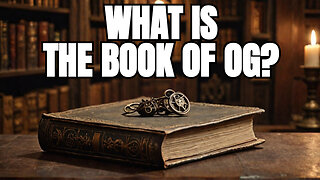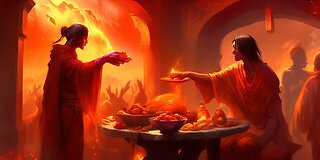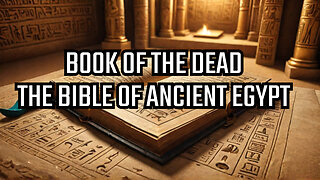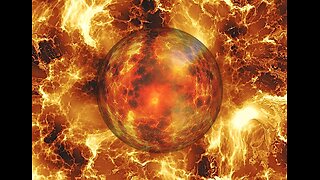Audiobook: Revolt Against the Modern World by Julius Evola, Part Two, Chapter 30-2
Chapter 30: The Heroic-Uranian Western Cycle, Part 2
THE ROMAN CYCLE
In this detailed exploration of the Hellenic and Roman cycles, we delve into the heroic and spiritual transformations that shaped ancient civilizations. Evola examines the distinct phases of Hellenic culture, from the sacred foundations of the Olympian and Hyperborean ideals to the eventual rise of democratic and antitraditional elements. Similarly, the Roman cycle is analyzed as a powerful reaction against Mediterranean decadence, culminating in the creation of a grand and universal empire. This video provides an in-depth look at the cultural, spiritual, and historical dynamics that defined these ancient societies.
Footnotes:
21 .Bachofen's work showed the analogy with civilizations of the eastern Mediterranean. Mosso noticed a general relationship between the Aegean (pre-Hellenic) civilization and the pre-Roman Italic civilization.
22. According to Livy (1.34), in the cult of Tanaquil the Etruscan women exercised the role of priestesses; this is a typical trait of the Pelasgic civilization.
23. The Roman gens that remained faithful to the ritual of inhumation was the gens Cornelia, whose characteristic cult was that of the telluric Venus.
24. The most ancient root of the cult of Bona Dea, a deity who at first was venerated in a chaste Demetrian form, reemerged in a decadent period of Roman history during which her cult came to be associated with uninhibited sexual promiscuity. Concerning Vesta, just as the maternal dignity of this goddess was respected and yet subordinated to the authority of the patres, likewise her cult was subjected to the pontifex magnus first and to the emperor later. After all, the official cult of fire in the time of Romulus was entrusted to priests; it became the legacy of the vestal virgins only as a decision of the Saline and lunar king Numa. Emperor Julian (Hymn to King Helios, 155a) eventually restored its solar character.
25. Vano, 5.74. In this context the lares are to be understood in their chthonic aspect. It would be interesting to examine the mixture of the telluric element, which is an Etruscan-Pclasgic remnant, with the “heroic” and patrician element in the Roman funerary cult. Also it would be interesting to analyze the phases of
26. 26. The most widespread classical tradition during the imperial era of Rome attributed an Asiatic origin to the Etruscans, in a way that can be summed up in Seneca's words: “Tuscos Asia sibi indicat. "According to some, the Etruscans belonged to the stock of the Tursha, seafolk whose dwelling was located in some island or region of the eastern Mediterranean and who invaded Egypt toward the end of the Eighteenth Dynasty. According to a more recent and reliable opinion, the Etruscans were the remnants of a popula¬tion that preexisted those Italic nuclei that had come from the north; this population was scattered in Spain, along the Tyrrhenian Sea, in Asia Minor and even along the Caucasus (from the Basques, to the Liddi and the Hittites); in that case they belong to the Atlantic-Pelasgic cycle. Other scholars, such as Altheim and Mosso, talk about the kinship existing between the Etruscan and Minoan civilizations not only because of the privileged role that women played in the cult, but also because of affinities that are evident in their architecture, art, and customs.
27. Dio, Roman History, 1.27. See also M. Pallottino, Etruscologia (Milan, 1942), 175-81. This author, in addition to "an abandonment and almost an abdication of spiritual human activity before the deity,” also noticed the gloomy and pessimistic Etruscan view of the afterlife, which did not know any hopes of immortality and heavenly survival for anybody, including the most exalted people.
28. Concerning the pathos of the afterlife, G. De Sanctis (.Storia dei Romani, 1.147) explained that a characteristic of the Etruscan soul was the "terror of the afterlife, which was expressed through figurations of dreadful demons, like the monster Tuchulcha, and through macabre portrayals that anticipate the medieval ones."
29. Ovid, Metamorphosis, 15.553.
30. According to Piganiol, in the methods of Roman divination there must have been an opposition between the Uranian and patrician ritual of the augurs and the chthonic ritual of the Etruscan haruspexes.
31. Livy, 22.22.6. Fides—in its various forms, such as Fides Romana, Fides Publica, and so on—was one of the most ancient deities of Rome.
32. In this context "magic” is understood in the higher sense of the word and is referred to the official Roman religion, which according to some, consisted in a sheer "formalism" lacking religious pathos; on the contrary, it expressed the ancient law of pure action. The Roman persecutions against magic and astrology only concerned inferior forms of religion, that were often superstitious or quackish. In reality, a magical attitude understood as an attitude of command and action upon invisible forces through the pure determinism of the ritual, constituted the essence of the early Roman religion and the Roman view of the sacred. Later on, though the Romans opposed the popular and superstitious forms of magic, they continued to have a great respect for the patrician cult and for the figure of the theurgist, who was shrouded with dignity and with ascetical purity.
33. Plutarch, Phyrro, 19.5. In the episode of the Gallic invasion, the countenance of the elders was described by Livy as “more than human," and as “very similar to the gods’" (5.41).
34. See for instance: (a) the “sign of the center,” the black stone Romulus put at the beginning of the Via Sacra; (t>) the fatidic and solar “twelve," which was the number ofvultures that gave Romulus the right to name the new city; the number of the lictorian fasces carrying an axe, the symbol of the Hyperborean conquerors; the number, instituted by Numa, of the ancilia (sacred shields) which were the pignora imperii (the pledge of command); and the number of the altars in the archaic cult of Janus; (c) the eagle, sacred to the god of bright skies, Jupiter, and also the signum of the Roman legions, which was also one of the Aryan symbols of the immortalizing “glory"; this is why the souls of the deceased Caesars were believed to take the form of an eagle and to fly into solar immortality; (d) the sacrifice of the horse, which corresponds to the aivamedha of the Indo-Aryans; (e) many other elements of a universal sacred tradition.
In regard to eagles, in ancient traditions we find the belief that the person on whom an eagle came to rest was predestined by Zeus to high offices or to regality and that the sight of an eagle was an omen of victory. The eagle was such a universal symbol that among the Aztecs it indicated the location for the capital of the new empire. The ba, the element of the human being destined to lead a heavenly eternal life in a state of glory, was often represented in Egyptian hieroglyphics as a sparrow hawk, which was the Egyptian equivalent of the eagle. In the Rg Veda (4.18.12; 4.27.2) the eagle carried the magic potion to Indra that consecrated him as the Lord of all gods, leaving behind infernal feminine forces. From a doctrinal point of view, this could be compared to the esoteric meaning of the Roman imperial apotheosis (consecratio) in which the flight of the eagle from the funeral pyre symbolized the deceased soul’s ensuing deification.
35. Pliny said: "Satumia ubi hue Roma est." Virgil (Aeneid, 357-58): "Hanc Janus pater, hanc Satumus condidit arcem: Janiculum huic, illi fuerat Satumia nomen."
36. Set, the dark brother who killed Osiris, was also called Typhon. According to Plutarch: “They called Typhon ‘Set’; for this name, which denotes overpowering and violence, also denotes frequent return and overleaping.” De /side et Osiride, 49. The enemies of the solar principle (Ra), who were called "the children of the hopeless revolt," were associated with Set.
37. According to Piganiol the duel between Hercules and Cacus may have been a legendary transposition of the struggle between an Aryan or Aryan-like stock and an aboriginal stock of a Pelasgic origin.
38. Macrobius, Saturnalia, 1.12.27.
39. After Numa, the king (who originally ranked higher than the flamines, who in turn corresponded to the Hindu brahmana) was opposed to the rex sacrorum, who during that period was an expression of the plebeian ritual, rather than a priest of the patrician rite; he was the mediator between the people and the great plebeian goddess, the Moon, who did not own the spectio (the right to inspect the aruspicina, which was an attribute typical of the patricians) and who, according to the ritual, ranked below the vestal virgins.
40.
41.
42. In the example of Rome following the libri sibillini and welcoming the Phrygian Great Goddess (as it did before with the Asiatic goddess of prostitution, following the defeat at Lake Trasimene) in order to facilitate a victory over Hannibal, Bachofen saw an Aphrodistic city that was almost afraid of having neglected the Mother for such a long time and of having consecrated itself entirely to the virile principle of the imperium. This is possible. On the other hand, we should not forget that according to the Romans a war could not truly be won other than by evoking and drawing to their side the gods of the enemy: the great Phrygian goddess was a copy of the Punic Tanit. The cult of that goddess was incorporated into the Roman world only later on and it spread among the plebeian classes especially.
43. It is interesting that Cleopatra pssumed the name “Isis" and Anthony, “Dionysus,” thus reproducing two
complementary types of a civilization of “Aphrodistic” type. See Dio Cassius, Roman History, 10.5.
44. Suetonius, Life of the Twelve Caesars (Julius Caesar, 6).
45. Rutilius Namatianus, De red. suo, 1.49,50,62-65.
46. Virgil, Eclogues, 4.5-10; 15-18. Among these prophetic expressions of Virgil we find mention of the serpent’s death (5.24); of a group of heroes who will renew the symbolic feat of Argon; and of Achilles who will wage a new symbolic war of the Achaeans against Troy.
47. Expressions of Lactantius, The Divine Institutes, 7.25.6; Tertullian, Ad scapulam, 2.
---
1. Audiobook: Revolt Against the Modern World by Julius Evola, Foreword (https://rumble.com/v4zm5tq-audiobook-revolt-against-the-modern-world-by-julius-evola-forward.html)
2. Audiobook: Revolt Against the Modern World by Julius Evola, Part One, Chapter 1, The Beginning (https://rumble.com/v4zmraf-audiobook-revolt-against-the-modern-world-by-julius-evola-part-one-chapter-.html)
3. Audiobook: Revolt Against the Modern World by Julius Evola, Part One, Chapter 2, Regality (https://rumble.com/v4zq2nw-audiobook-revolt-against-the-modern-world-by-julius-evola-part-one-chapter-.html)
4. Audiobook: Revolt Against the Modern World by Julius Evola, Part One, Chapter 3, Polar Symbolism (https://rumble.com/v4zr566-audiobook-revolt-against-the-modern-world-by-julius-evola-part-one-chapter-.html)
5. Audiobook: Revolt Against the Modern World by Julius Evola, Part One, Chapter 4, The Law, The State, The Empire (https://rumble.com/v4zshwr-audiobook-revolt-against-the-modern-world-by-julius-evola-part-one-chapter-.html)
6. Audiobook: Revolt Against the Modern World by Julius Evola, Part One, Chapter 5, The Mystery of the Rite (https://rumble.com/v4zv075-audiobook-revolt-against-the-modern-world-by-julius-evola-part-one-chapter-.html)
7. Audiobook: Revolt Against the Modern World by Julius Evola, Part One, Chapter 6, On the Primordial Nature of the Patriciate (https://rumble.com/v4zydz5-audiobook-revolt-against-the-modern-world-by-julius-evola-part-one-chapter-.html)
8. Audiobook: Revolt Against the Modern World by Julius Evola, Part One, Chapter 7, Spiritual Virility (https://rumble.com/v500py2-audiobook-revolt-against-the-modern-world-by-julius-evola-part-one-chapter-.html)
9. Audiobook: Revolt Against the Modern World by Julius Evola, Part One, Chapter 8, The Two Paths in the Afterlife (https://rumble.com/v50556i-audiobook-revolt-against-the-modern-world-by-julius-evola-part-one-chapter-.html)
10. Audiobook: Revolt Against the Modern World by Julius Evola, Part One, Chapter 9, Life and Death of Civilizations (https://rumble.com/v50aqwt-audiobook-revolt-against-the-modern-world-by-julius-evola-part-one-chapter-.html)
11. Audiobook: Revolt Against the Modern World by Julius Evola, Part One, Chapter 10, Initiation and Consecration (https://rumble.com/v50kzgb-audiobook-revolt-against-the-modern-world-by-julius-evola-part-one-chapter-.html)
12. Audiobook: Revolt Against the Modern World by Julius Evola, Part One, Chapter 11, On the Hierarchical Relationship Between Royalty and Priesthood (https://rumble.com/v50rmrr-monetized-audiobook-revolt-against-the-modern-world-by-julius-evola-part-on.html)
13. Audiobook: Revolt Against the Modern World by Julius Evola, Part One, Chapter 12, Universality and Centralism (https://rumble.com/v50sybe-audiobook-revolt-against-the-modern-world-by-julius-evola-part-one-chapter-.html)
14. Audiobook: Revolt Against the Modern World by Julius Evola, Part One, Chapter 13, The Soul of Chivalry (https://rumble.com/v51anjl-audiobook-revolt-against-the-modern-world-by-julius-evola-part-one-chapter-.html)
15. Audiobook: Revolt Against the Modern World by Julius Evola, Part One, Chapter 14, The Doctrine of the Castes (https://rumble.com/v51o38z-audiobook-revolt-against-the-modern-world-by-julius-evola-part-one-chapter-.html)
16. Audiobook: Revolt Against the Modern World by Julius Evola, Part One, Chapter 15, Professional Associations and the Arts; Slavery (https://rumble.com/v525v94-audiobook-revolt-against-the-modern-world-by-julius-evola-part-one-chapter-.html)
17. Audiobook: Revolt Against the Modern World by Julius Evola, Part One, Chapter 16, Bipartition of the Traditional Spirit; Asceticism (https://rumble.com/v525zx1-audiobook-revolt-against-the-modern-world-by-julius-evola-part-one-chapter-.html)
18. Audiobook: Revolt Against the Modern World by Julius Evola, Part One, Chapter 17, The Greater and the Lesser Holy War (https://rumble.com/v526gxc-audiobook-revolt-against-the-modern-world-by-julius-evola-part-one-chapter-.html)
19. Audiobook: Revolt Against the Modern World by Julius Evola, Part One, Chapter 18, Games and Victory (https://rumble.com/v5272gy-audiobook-revolt-against-the-modern-world-by-julius-evola-part-one-chapter-.html)
20. Audiobook: Revolt Against the Modern World by Julius Evola, Part One, Chapter 19, Space, Time, the Earth (https://rumble.com/v52ee4o-audiobook-revolt-against-the-modern-world-by-julius-evola-part-one-chapter-.html)
21. Audiobook: Revolt Against the Modern World by Julius Evola, Part One, Chapter 20, Man and Woman (https://rumble.com/v52etn8-audiobook-revolt-against-the-modern-world-by-julius-evola-part-one-chapter-.html)
22. Audiobook: Revolt Against the Modern World by Julius Evola, Part One, Chapter 21, The Decline of Superior Races (https://rumble.com/v52f2wz-audiobook-revolt-against-the-modern-world-by-julius-evola-part-one-chapter-.html)
23. Audiobook: Revolt Against the Modern World by Julius Evola, Part Two, Genesis and Face of the Modern World, Introduction (https://rumble.com/v52j35f-audiobook-revolt-against-the-modern-world-by-julius-evola-part-two-introduc.html)
24. Audiobook: Revolt Against the Modern World by Julius Evola, Part Two, Chapter 22, The Doctrine of the Four Ages (https://rumble.com/v52jgnv-audiobook-revolt-against-the-modern-world-by-julius-evola-part-two-chapter-.html)
25. Audiobook: Revolt Against the Modern World by Julius Evola, Part Two, Chapter 23, The Golden Age (https://rumble.com/v52k2of-audiobook-revolt-against-the-modern-world-by-julius-evola-part-two-chapter-.html)
26. Audiobook: Revolt Against the Modern World by Julius Evola, Part Two, Chapter 24, The Pole and the Hyperborean Region (https://rumble.com/v52l5fs-audiobook-revolt-against-the-modern-world-by-julius-evola-part-two-chapter-.html)
27. Audiobook: Revolt Against the Modern World by Julius Evola, Part Two, Chapter 25, The Northern-Atlantic Cycle (https://rumble.com/v52lmre-audiobook-revolt-against-the-modern-world-by-julius-evola-part-two-chapter-.html)
28. Audiobook: Revolt Against the Modern World by Julius Evola, Part Two, Chapter 26, North and South (https://rumble.com/v52qht7-audiobook-revolt-against-the-modern-world-by-julius-evola-part-two-chapter-.html)
29. Audiobook: Revolt Against the Modern World by Julius Evola, Part Two, Chapter 27, The Civilization of the Mother (https://rumble.com/v52s4qq-audiobook-revolt-against-the-modern-world-by-julius-evola-part-two-chapter-.html)
30. Audiobook: Revolt Against the Modern World by Julius Evola, Part Two, Chapter 28, The Cycles of Decadence and the Heroic Cycle (https://rumble.com/v52ssg7-audiobook-revolt-against-the-modern-world-by-julius-evola-part-two-chapter-.html)
31. Audiobook: Revolt Against the Modern World by Julius Evola, Part Two, Chapter 29, Part 1, THE AMERICAN CYCLE AND THE EASTERN MEDITERRANEAN CYCLE (https://rumble.com/v52wwp5-audiobook-revolt-against-the-modern-world-by-julius-evola-part-two-chapter-.html)
32. Audiobook: Revolt Against the Modern World by Julius Evola, Part Two, Chapter 29, Part 2, THE HEBREW CYCLE AND THE EASTERN ARYAN CYCLE (https://rumble.com/v52xk3d-audiobook-revolt-against-the-modern-world-by-julius-evola-part-two-chapter-.html)
33. Audiobook: Revolt Against the Modern World by Julius Evola, Part Two, Chapter 30: The Heroic-Uranian Western Cycle, Part 1 (https://rumble.com/v52zblu-audiobook-revolt-against-the-modern-world-by-julius-evola-part-two-chapter-.html)
34. Audiobook: Revolt Against the Modern World by Julius Evola, Part Two, Chapter 30: The Heroic-Uranian Western Cycle, Part 2 (https://rumble.com/v52zn03-audiobook-revolt-against-the-modern-world-by-julius-evola-part-two-chapter-.html)
35. Audiobook: Revolt Against the Modern World by Julius Evola, Part Two, Chapter 31, Syncope of the Western Tradition (https://rumble.com/v533fax-audiobook-revolt-against-the-modern-world-by-julius-evola-part-two-chapter-.html)
36. Audiobook: Revolt Against the Modern World by Julius Evola, Part Two, Chapter 32, The Revival of the Empire and the Ghibelline Middle Ages (https://rumble.com/v533vya-audiobook-revolt-against-the-modern-world-by-julius-evola-part-two-chapter-.html)
37. Audiobook: Revolt Against the Modern World by Julius Evola, Part Two, Chapter 33, Decline of the Medieval World and the Birth of Nations (https://rumble.com/v5346cg-audiobook-revolt-against-the-modern-world-by-julius-evola-part-two-chapter-.html)
38. Audiobook: Revolt Against the Modern World by Julius Evola, Part Two, Chapter 34, Unrealism and Individualism (https://rumble.com/v535jkt-audiobook-revolt-against-the-modern-world-by-julius-evola-part-two-chapter-.html)
39. Audiobook: Revolt Against the Modern World by Julius Evola, Part Two, Chapter 35, The Regression of the Castes (https://rumble.com/v535tox-audiobook-revolt-against-the-modern-world-by-julius-evola-part-two-chapter-.html)
40. Audiobook: Revolt Against the Modern World by Julius Evola, Part Two, Chapter 36, Nationalism and Collectivism (https://rumble.com/v53bwd2-audiobook-revolt-against-the-modern-world-by-julius-evola-part-two-chapter-.html)
41. Audiobook: Revolt Against the Modern World by Julius Evola, Part Two, Chapter 37, The End of the Cycle (https://rumble.com/v53c5ag-audiobook-revolt-against-the-modern-world-by-julius-evola-part-two-chapter-.html)
42. Audiobook: Revolt Against the Modern World by Julius Evola, Conclusion (https://rumble.com/v53hjf7-audiobook-revolt-against-the-modern-world-by-julius-evola-conclusion.html)
-
 27:34
27:34
Dangerous reads
14 days agoAudiobook: Revolt Against the Modern World by Julius Evola, Part Two, Chapter 30-1
19 -
 20:10
20:10
Dangerous reads
16 days agoAudiobook: Revolt Against the Modern World by Julius Evola, Part Two, Chapter 25
72 -
 51:07
51:07
The Jeremy Ryan Slate Show
17 days ago $0.22 earnedAncient Secrets to Fixing Our Broken Society, Feat. Alex Petkas
2523 -
 24:46
24:46
CatholicReboot
26 days ago $0.01 earnedEpisode 2213: Books of the Bible - Sirach (Ecclesiasticus)
247 -
 35:45
35:45
The 5th Kind
25 days agoThe Book of the Secrets of Enoch | Mauro Biglino - The Bible, Anunnaki Gods , Elohim & The Nephilim
1.89K2 -
 11:16
11:16
MicrophoneTherapy
1 month agoWe Learn About The Forbidden Book of Og
42 -
 1:05:48
1:05:48
KJVStream
13 days agoThe Book of Romans, King James Version (KJV) Illustrated by AI (V1)
57 -
 12:51
12:51
MicrophoneTherapy
1 month agoWe Learn About the Egyptian Book of the Dead
46 -
 2:58:40
2:58:40
The Common Surface Podcast
1 month agoJoseph P Farrell, A Pious Man Mistranslates a Word and Splits Europe
2892 -
 17:59
17:59
BiblicalGold
17 days agoThe Vison of Paul part 6
291